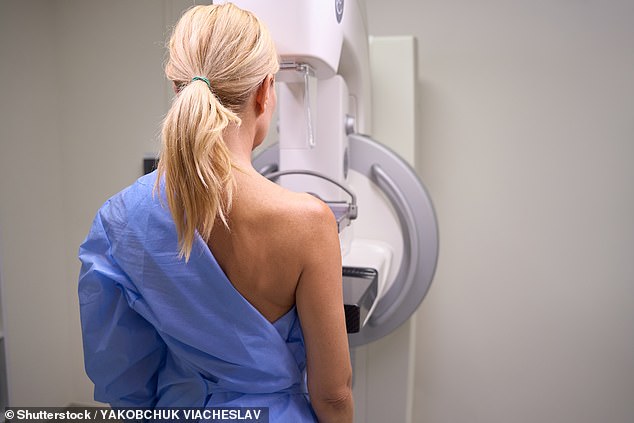Women with “concerning” breast lumps will be able to be referred directly to a specialist in an effort to improve cancer outcomes.
Wes Streeting said the move will have the added benefit of freeing up GP appointments for other patients and could soon be extended to more conditions.
The Health Secretary made the announcement today at the Royal College of GPs annual conference in Liverpool, where he also promised to “cut through red tape and reduce red tape” so doctors can spend more time treating and less time filling out forms.
Streeting told delegates he knew how “intolerable” it is for GPs who spend a fifth of their time dealing with administration, with some doctors forced to fill out more than 150 forms when referring patients to a consultant.
He launched a “bureaucratic challenge”, encouraging doctors to tell officials where time could be saved and said he and Amanda Pritchard, chief executive of NHS England, would review them.
Women with “concerning” breast lumps will be able to be referred directly to a specialist in an effort to improve cancer outcomes.
Streeting added: ‘The other frustration I hear from both staff and patients is the useless appointments you are forced to keep and patients are forced to attend.
‘You didn’t go through five years of medical school, plus five years of training, to check boxes.
“So, where there are appointments that can be cut – with patients seen by specialists more quickly and free time for GPs to do what only GPs can do – we will act.
‘From November, 111 Online, which is available through the NHS app, will trial direct referral of women with a worrying lump to a breast clinic.
“That means faster diagnosis for cancer patients and more free appointments for the GP. Better for patients and better for GPs.
‘And I suspect there are other cases that come across your desks every week where someone else in the NHS passes a patient on to someone else in the NHS too.
‘It’s a waste of everyone’s time, including yours.
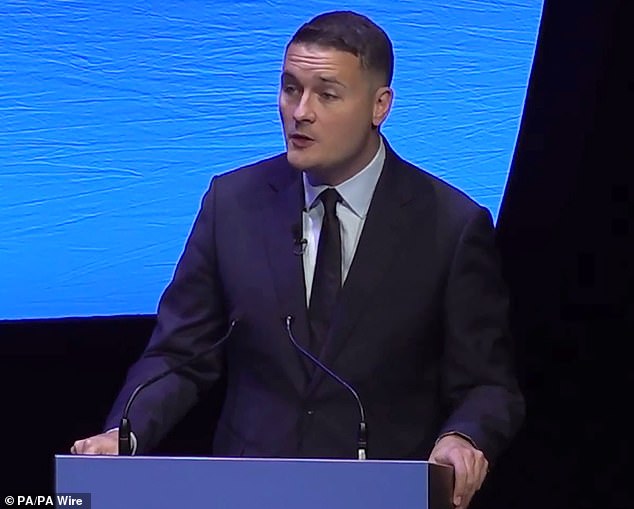
Health Secretary Wes Streeting said the move will have the added benefit of freeing up GP appointments for other patients and could soon be extended to more conditions.
“And when you give us examples of patient pathways that can be simplified for appropriate patient self-referral (or direct referral by other NHS services) to save you time, we will act.”
Breast cancer is the most common form of cancer in women in the UK, with around 57,000 new cases diagnosed each year.
About 85 percent of women with the disease will survive five years or more, but the chances of dying increase the later it is discovered.
The pilot will see women with “red flag symptoms” referred to breast diagnostic clinics without needing to first consult a GP.
It will be launched in Somerset before rolling out nationwide, if successful.
Streeting also urged GPs to end their strike, which has halved the number of appointments they offer to just 25 a day.
He warned that the restrictions “punish” patients and put more pressure on other parts of the NHS.
The Government will work to introduce single patient records, which can be accessed by medical staff in GP surgeries and hospitals, he revealed.
Currently, records are not routinely shared between primary and secondary care, which undermines care and forces patients to repeat their medical records to physicians when moving between organizations.
Ministers also want to make it easier for researchers to use patients’ medical records for studies, subject to patient consent and adequate data security.
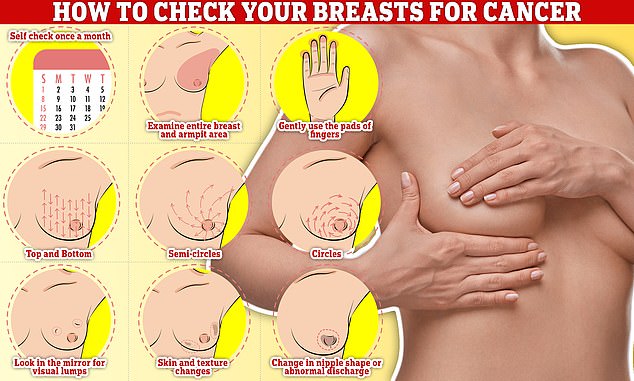
Checking your breasts should be part of your monthly routine so that you notice any unusual changes. Simply rub and feel up and down, feeling in semicircles and in a circular motion around the breast tissue to detect any abnormalities.
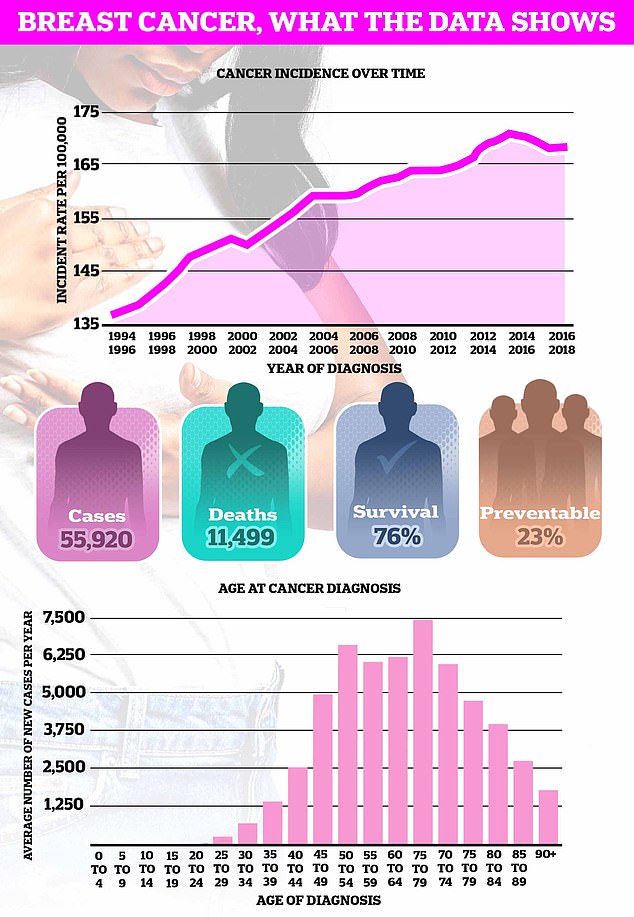
Breast cancer is the most common cancer in the UK, with almost 56,000 cases diagnosed each year.
Streeting said: “We need to work together to create a single patient record, owned by the patient, shared across the system so that every part of the NHS has a complete picture of the patient.
‘This applies to both research and healthcare. The two go hand in hand.
‘World-leading studies such as the UK Biobank, Genomics England and Our Future Health are creating incredibly detailed profiles of our nation’s health.
‘Patients have given consent for their data to be shared with these studies. But we still see, all too often, that this data is not shared according to patients’ wishes.
“That is why I am ordering NHS England to take this burden off them.
‘Just as they did during the pandemic, if a patient gives explicit consent to share their data with a study, NHS England will take responsibility for this happening. In return, we will demand the highest standards of data security.”
Sally Kum, associate director of nursing and health information at Breast Cancer Now, said: “Two-thirds of breast cancers in England are detected when women discover a new or unusual change in their breast and it is examined by a GP ( Crucially, the sooner the cancer is diagnosed, the greater the chances of treatment being successful and lives being saved from this disease.
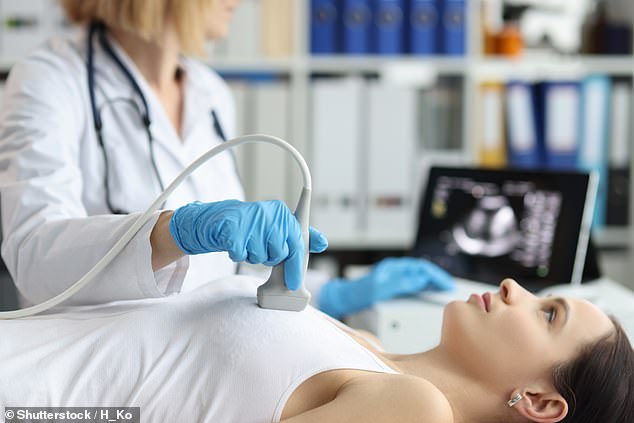
About four in five patients will have surgery to remove the cancer or the entire breast (file image)
‘We tirelessly advocate for timely access to breast cancer diagnosis and treatment, as we know it can make a difference. As such, we welcome the Government’s focus on ensuring that more people are referred to a specialist more quickly when they discover a change in their breasts.
‘We look forward to seeing the results and impact of this pilot plan; Fundamental to its sustainability and success will be its consideration of 111’s capacity and resource needs in service delivery.
“In addition, we continue to encourage all women to ‘know your normal’ by familiarizing themselves with the signs and symptoms of breast cancer and prioritizing regular breast monitoring and reporting any new or unusual breast changes to a GP.”
Dr Vin Diwakar, NHS Chief Medical Officer of Transformation, said: “New technology has the power to transform the way we manage our healthcare – we are excited to be able to trial in Somerset whether online 111 could refer women with alert symptoms for breast cancer checks without the need to see a GP, and this is just the start of our plans to bring NHS services to patients through the app.
‘Our ambition is to create a single patient record so healthcare staff can view their medical history at the touch of a button without having to repeat it over and over again, and we want to create a future where the data held by the NHS can be be used to save lives by predicting who is most at risk of developing cancer or other diseases and taking steps to prevent them.’

